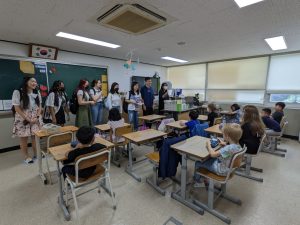
South Korea is home to one of the most homogeneous populations in the world. But any foreigner roaming the streets of Hongdae, Myeongdong, Itaewon and other popular tourist areas in its capital city, Seoul, would hardly feel out of place, comfortable in the company of fellow outsiders. Establishments in these hotspots are well-equipped to meet the needs of their international clientele, with their storefronts embellished with multilingual sign boards and their employees boasting a wide linguistic repertoire. So streamlined is the tourist experience that one can easily get around without knowing a modicum of Korean, or even feeling the need to learn it.
But as you venture further from these bubbles of diversity, the hospitality melts away, especially towards foreigners who look distinctly non-Korean. Even those protected by the guise of East Asian features can only blend in with the crowd for so long— betrayed quickly by their strange accents and piecemeal understanding of the Korean language (garnered largely from consuming the country’s popular media). Granted, the homogeneity hardly bothers passing visitors, who leave after sampling local delicacies and posing for glamorous Instagram photoshoots. But cultural assimilation constitutes a practical challenge for immigrants, for whom Seoul is not simply a holiday destination but a new home. This drastic transition is especially daunting for their children, who can hardly comprehend or speak the language, let alone adapt to a rapidly evolving culture that even locals struggle to keep abreast of.
In this sea of uniformity, Jiguchon School exists as a sanctuary of diversity, where children from a plethora of backgrounds play and learn together, and friendships forged through common experiences transcend language barriers and cultural differences. This coexistence is not always a bed of roses. The children, no matter how young, are well-aware of the fact that their classmates look and speak differently from them. Their naivety and brutal honesty often instigate questions that lack cultural sensitivity or political correctness. Their drastically different backgrounds make it difficult to conduct lessons with the same level of engagement for everyone, especially given the school’s tight budget and limited manpower.
Nevertheless, every interaction I’ve had with the kids over the past two days has been endearing, rewarding, heart-wrenching and motivating in ineffable ways. I feel empowered by the opportunity that Jiguchon and DukeEngage have presented me with to make a difference in the lives of these children, but cannot help but wonder if my efforts will induce any lasting change in the grand scheme of things, or if their effectiveness will be undermined by systemic problems only money can solve.
I guess only time will tell.
– Valerie Tan
___________________________________________________________
We’ve only been in South Korea for one week, but we’ve experienced so much that it feels like much longer.
As the excitement of being in another country subsided, the anticipation – and apprehension – of teaching at Jiguchon School crept in. Would I be good enough? Would I be able to connect with the children? Would I be able to manage any unexpected difficulties? These questions swarmed through my head and collected in a nervous jumble in my stomach as we entered school on our first day as English teachers. My worries quickly melted away in the midst of our students’ excited chattering (and a few Chinese curse words) as we entered the room.
For the past few days, I’ve watched our 1st and 2nd grade students learn and engage with our content and us, and my anxieties have been replaced by excitement and joy. Though we’ve only spent a few days with the students, I already have a sense of their personalities, and a glimpse of their potential hardships. Though some of the children are still shy and reluctant to engage, they are slowly beginning to open up. I hope that during our next week together, I can learn more about each of them and grow closer to them.
With the middle and high school students, we faced not only the typical dose of teenage angst and immature humor, but also unexpected language barriers that made our carefully planned curriculum obsolete. We did the best we could to quickly create a new plan on the spot while managing a room full of teenagers growing more restless by the minute. Although our first session didn’t go as planned, and we definitely struggled, I’m confident that we’ll be able to create a better curriculum for our next class now that we know more about our students. Though they may be less willing to engage than the elementary school students, I believe that through appealing to their interests we’ll be able to connect with them – and hopefully teach some English along the way!
While it seems like we’ve been here for a long time, I’m sure that by the time the summer ends I’ll be remarking how quickly the time seemed to fly by. For now, I’ll make the most of our time here and enjoy each day to the fullest.
– Sydney Mayor
___________________________________________________________
I entered the country with zero expectations and the classroom with even lower expectations. While my experiences outside of Jiguchon have been exciting and new, filling me with a newfound energy, the brief amount of time I have dedicated to the school so far has been more of a challenge.
Although I had had plenty of experience working with children in a classroom setting, both online and off, I couldn’t help the nervous energy buzzing through me when we first met the elementary schoolers. Perhaps it was the lack of clarity regarding logistics, or the extreme language barrier, or absence of guidance from authorities, but the first day caused me to spiral about my teaching abilities. As we stumbled through the lesson, we encountered multiple obstacles, including a crying student, verbal and physical violence, and lack of enthusiasm/interest. No matter how much confidence I had in my ability to deal with kids before, this was a challenge like no other.
However, the more I reflect upon the first day, the more I realize that, given the circumstances, my peers and I managed to pull together quite well. Upon realizing that our initial plans would not pan out, we quickly improvised new activities and gained a better understanding of what the students would enjoy. Luckily, we were also able to give each student individual attention at times, allowing us to connect with each of them on a more emotional level. Despite the chaos of our first day, the next day went infinitely more smoothly; the kids were more receptive and willing to engage with both the lessons and us as people. The rowdiness became more manageable, everyone became more comfortable with each other, and I believe I can speak for everyone when I say that the day was quite fulfilling.
The middle school was a different story. After our lessons were over, we all gathered in the computer room and talked for an hour about things that had gone wrong. Unlike with the elementary schoolers, the older students were much more aware of the way we were struggling and latched onto that fact. Although I was pretty happy with my and Valerie’s students, I had to assist with another class due to an unexpected language barrier and the energy was much more stifling. I think the overall consensus was that despite each class’s given levels of English mastery, our interactions with the students revealed that the labels weren’t accurate. With this new understanding, we will have to revise our lessons accordingly and consider the possibility of shifting some students around, as well as teachers. Hopefully a second session with the older kids will allow us to understand their needs a little better and make them more receptive to our lessons.
We’ve only technically worked at Jiguchon for two days, so there is much more for us to teach and much more for us to learn. I look forward to seeing us improve as teachers and creating more meaningful connections with the students.
– Jeanie Jia
___________________________________________________________
In just the first few weeks of being in Korea I have experienced and learned so much. After landing in Incheon exhausted and delirious from a 15 hour flight, I was suddenly filled with excitement and wonder when the reality that I was in Seoul sunk in. Even when that initial shock wore off, each new experience I would have in the coming weeks, whether it was Karaoke, KBBQ, or shopping in malls that looked straight out of a Sci-Fi movie, reignited that feeling of amazement in me. The most significant of those new experiences was coming to Jiguchon for the first time. The night before we were to go to the school for the first time, I think everyone in the program was feeling a collective mix of excitement and terror. Even those of us who have worked with kids before worried about being accepted and able to accomplish the mission we were here to do. Much of those fears subsided however after only our first class period.
To say that the kids were accepting would be an understatement. I won’t forget when we walked in the classroom the first thing one of the students said was “I’m so excited I don’t know if I can stand it.” Although the kids were seemingly boiling over with energy and had a hard time paying attention at times, they were all respectful and truly kind. It was not hard getting them engaged either, they jumped at the worksheets we gave them and loved any and all games. Even after just the first day I could already feel relationships forming and it did not take them long to warm up to us at all. They all had their own unique strengths whether it was math, jumping rope, or taking charge of their peers. After the day ended we all gathered to debrief, and while peoples experiences were certainly mixed, the overall consensus was that things went better than we had expected.
The night before we were going to teach middle schoolers for the first time a similar sense of anxiety fell on the group. Working with younger students proved to not be as stressful seeing that seemingly any game could be used to occupy their attention. However, some of the older students are nearly our age and so we knew finding ways to keep them entertained and engaged would be more difficult. Moreover, in our time at the school prior, we had seen that the older kids were quite energetic and rowdy at times and so keeping them occupied seemed an even more daunting task. However, once again my fears were dissolved once again within 5 minutes of the class period starting. The students were so excited and interested in asking us about America and our experiences that we were able to pass a lot of time by simply standing in front of the class and conversing with them. Additionally, even the games we thought might bore them turned out to be great hits. It was so encouraging to be so well received that my fear was soon replaced with a sadness that we would only be able to spend a short period of time with them.
As was said multiple times in this blog so far, although we have only been in Seoul for a little more than a week now, it truly feels like we’ve been here for a lifetime. I already feel this experience changing me as an individual and I’m so excited to see the person I become at the end of the program. On top of all of that, I now truly recognize our great potential to make a real impact on the lives of our students, and for that I am beyond elated.
– Josh Wagner
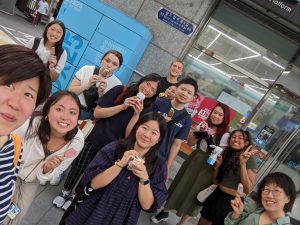
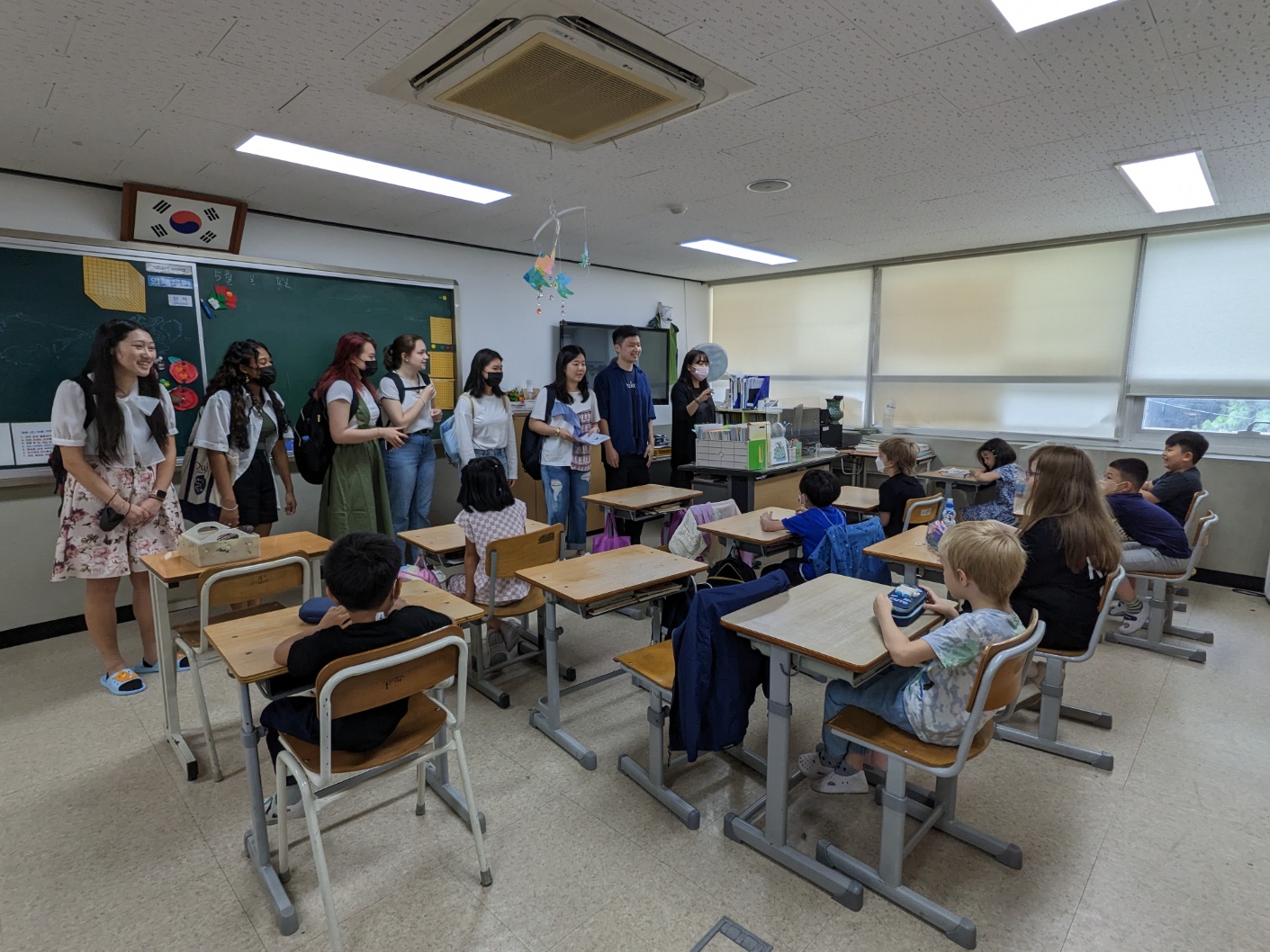
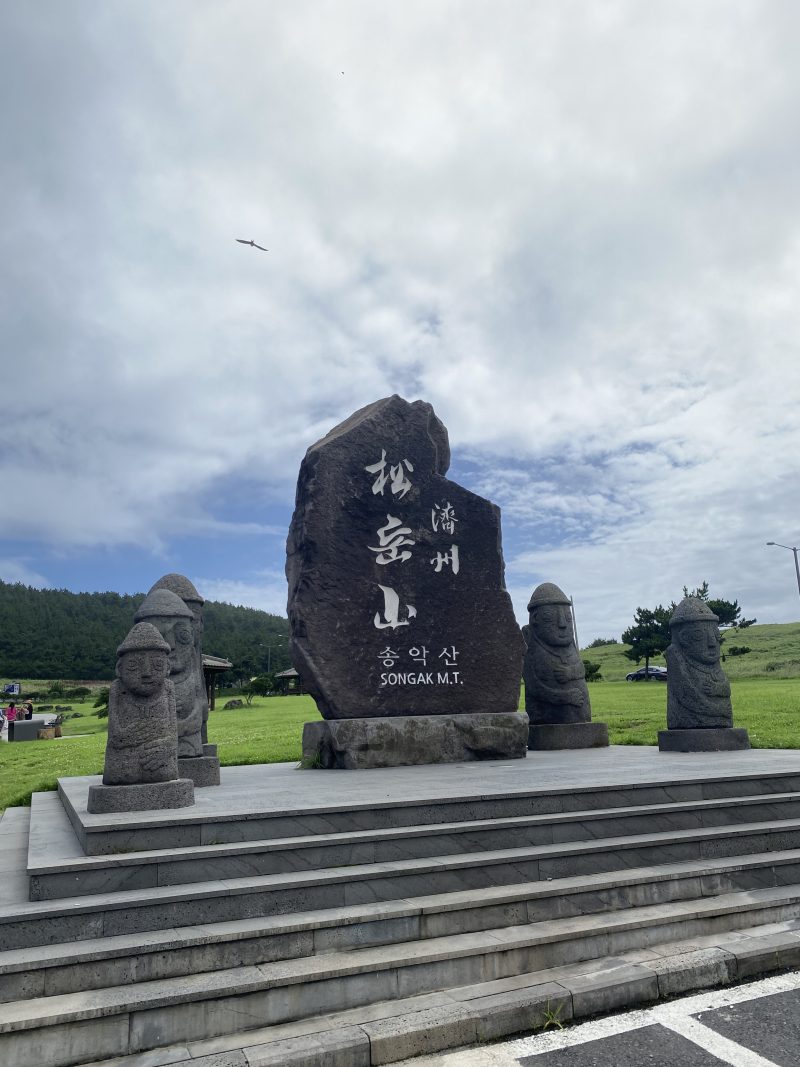

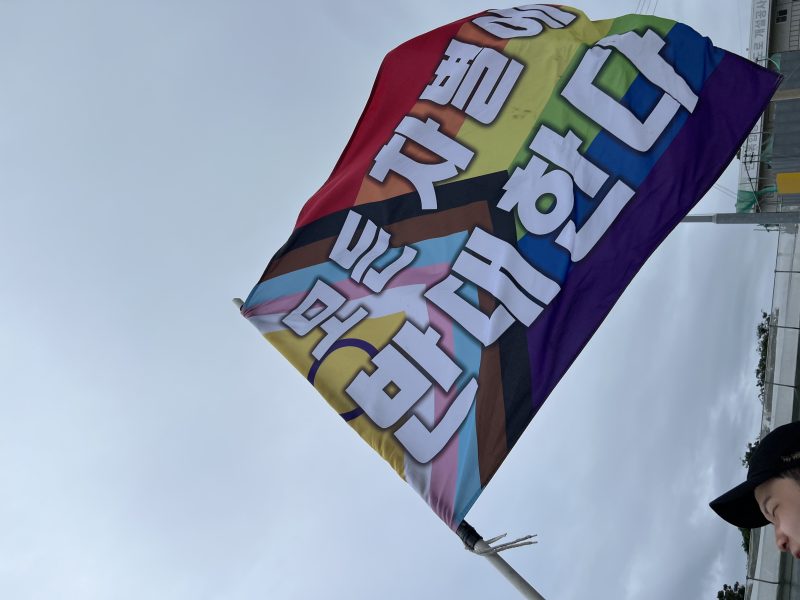
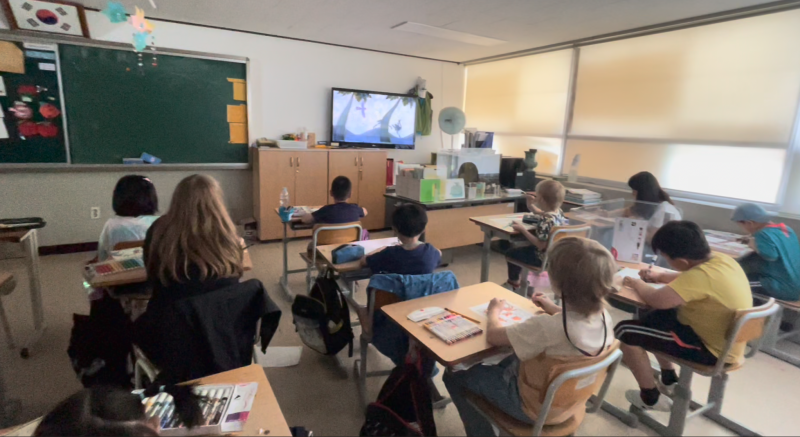
2 Comments
Add Yours →Wow, what a cool blog post! The Duke Engage Korea program seems so “daebak”!
Awww, I love the picture choices too!